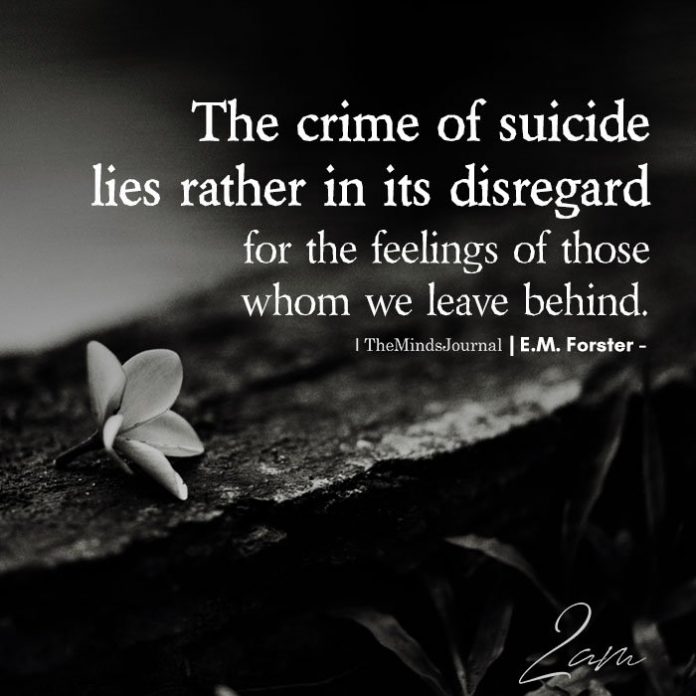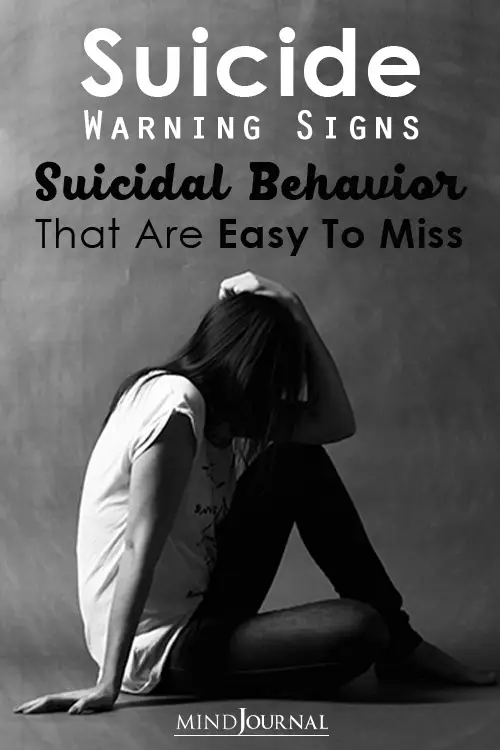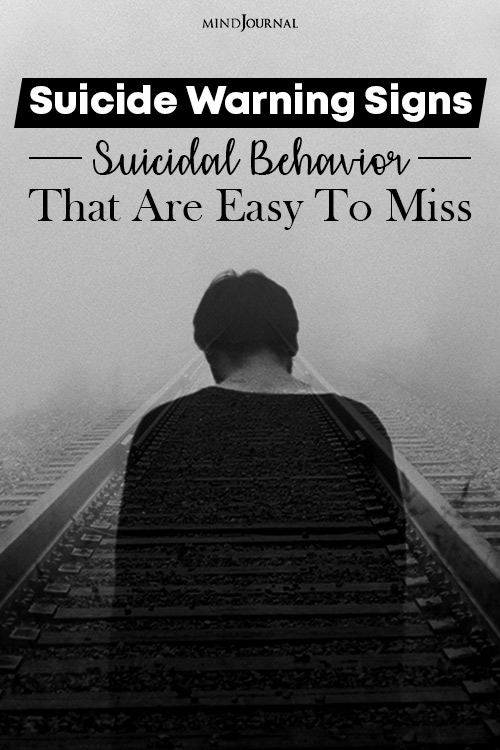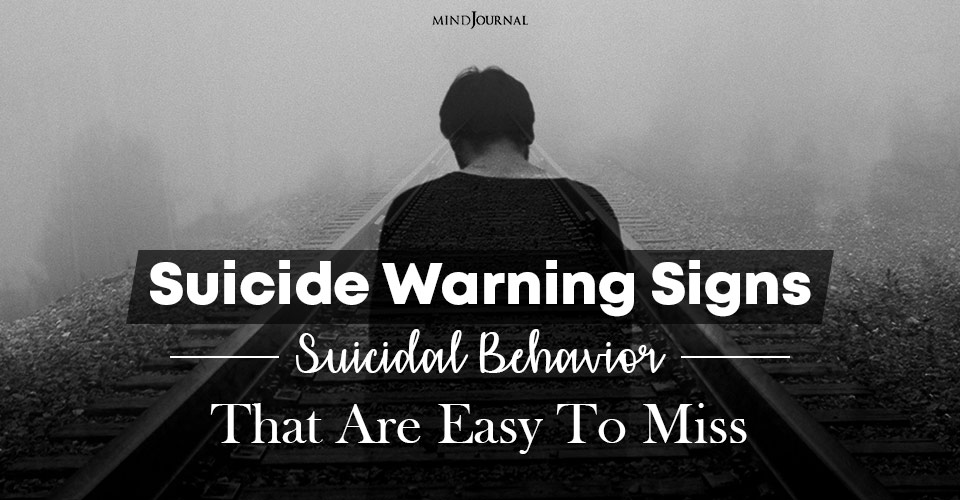Trigger Warning:
Suicide has always been a terrifying and sensitive subject to talk about and deal with. Even though it might be difficult talking about feeling suicidal, reaching out and having open-minded conversations is crucial in handling such devastating thoughts.
Talking about it can help sufferers take the first steps towards recovery and positivity. Even if people who are suffering don’t talk about it, then friends and family can watch out for suicide warning signs that might give them an idea about what’s going on.
People who are suicidal or have suicidal tendencies normally tend to find life’s challenges to be too overwhelming and hard to overcome. They feel hopeless and defeated, and tend to look towards suicide as the only respite from all the pain and pressure. Furthermore, if anyone has a family history of suicide, then taking this extreme step seems like an easier and logical option to them.
Here Are A Few Risk Factors That Might Lead To Suicide
- Isolating themselves from their family, friends, and loved ones.
- Experiencing tough life events one after the other.
- Struggles with mental health, particularly depression.
- History of mental illnesses.
- History of sexual and physical abuse.
- Struggles with substance abuse such as alcoholism, drug use, etc.
- History of suicidal attempts.
- Family history of suicide.
- Difficult and dysfunctional childhood (maltreatment).
- Lack of emotional and mental support from close ones.
- Feeling hopeless, demoralized, and defeated.
These risk factors play a huge role in influencing a person to take that dreaded step, and the more factors there are, the greater risk there is.
Related: 8 Risk Factors for Suicide
If you want to help someone get through this, or want to understand more about how you can detect whether someone is feeling suicidal or not (even if they don’t show any trace of it), then you can look out for some behavioral, verbal, emotional, and physical warning signs. These signs can help you a lot in recognizing whether a person is feeling suicidal or not.

Here Are Some Suicidal Warning Signs That Shouldn’t Be Ignored
1. Behavioral Suicide Warning Signs
– Looking up and reading a lot about suicide on the web, and also reading up about the different ways one can take their own life.
– Keeping themselves isolated from everyone, and always wanting to stay alone.
– Aggressive behavioral tendencies.
– Displaying careless and reckless behavior, especially in regards to their own life.
– Pushing away their loved ones, and showing zero interest in communicating with them.
– Escalated use of substance abuse (alcohol, drugs, etc.)
– Showing no interest in things they used to love to do before.
– Writing a will or giving away their belongings, all of a sudden.
– Self-harming tendencies.
2. Verbal Suicide Warning Signs
– Tired of living and existing, and saying things like “I don’t want to/I can’t do this anymore.”
– Considering themselves a burden on everyone.
– Believing that their life has no meaning and purpose.
– Constantly fixating on death, and talking about it.
– Feeling that they are stuck in a rut.
– Passive statements like “I don’t think it would matter to anyone if I don’t exist.”, “I wish I have an accident.”, “I wish I get hit by a car.”, etc.
– Active statements like “I don’t want to live anymore”, “I will kill myself”, etc.
When it comes to passive statements about this, unfortunately, most people tend to dismiss it as a joke, or something that is being said, “just like that”. But, what people don’t realize is that passive statements like these might be a heart-breaking cry for help.
So, the next time you hear someone express something like this, take it seriously, reach out, and assure them that they are not alone, and you will try to help them in every way possible.
Related: Robin Williams’ Wife Unveils the True Reason Behind His Suicide
3. Emotional Suicide Warning Signs
– Depression.
– Anxiety.
– Extreme and frequent mood swings.
– Emotional aggression.
– Irritable nature.
– Breaking down and crying easily. Irrational expectations from oneself and a sense of self.
– Difficulty focusing and concentrating.
4. Physical Suicide Warning Signs
– Sudden/drastic changes in appetite.
– Lack of appetite.
– Weight fluctuations/ extreme changes in weight.
– Unable to sleep at all or sleeping more than normal.
– Lack of interest when it comes to physical appearance.
– Feeling tired and fatigued all the time.
– Poor health.
If you see any of these signs in someone, then don’t ignore them. Reach out to them, and even if they don’t open themselves up to you in the first few tries, don’t give up. It’s not always easy to talk about something so painful, so try to be there by their side.
Related: Suicide Is Never The Answer: 6 Things To Know When Ending Life Seems Like The Best Option
Simply listening to someone, and reassuring them that they are not alone, is sometimes enough to save their lives. Showing simple kindness towards others can go a long way in helping them heal, and give them the positivity and encouragement to not give up on their lives.
If you are struggling with suicidal thoughts or you know someone who is, then you can contact these helpline numbers:
The veterans' suicide hotline (Veterans Crisis Line): 1-800-273-8255, press 1 or text to 838255 (available 24 hours a day, seven days a week) Teen suicide hotline (Thursday's Child National Youth Advocacy Hotline): 1-800-USA-KIDS (872-5437) (available 24 hours a day, seven days a week) Lesbian, Gay, Bisexual, Transgender and Questioning (LGBTQ) Suicide Hotline (the Trevor Lifeline): 1-866-488-7386 (available 24 hours a day, seven days a week) TrevorText text messaging: Text the word "Trevor" to 1-202-304-1200 (Available on Fridays (4:00 p.m. - 8:00 p.m. ET / 1:00 p.m. - 5:00 p.m. PT) You Matter website: https://youmatter.suicidepreventionlifeline.org/










Leave a Reply
You must be logged in to post a comment.